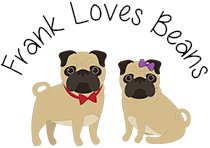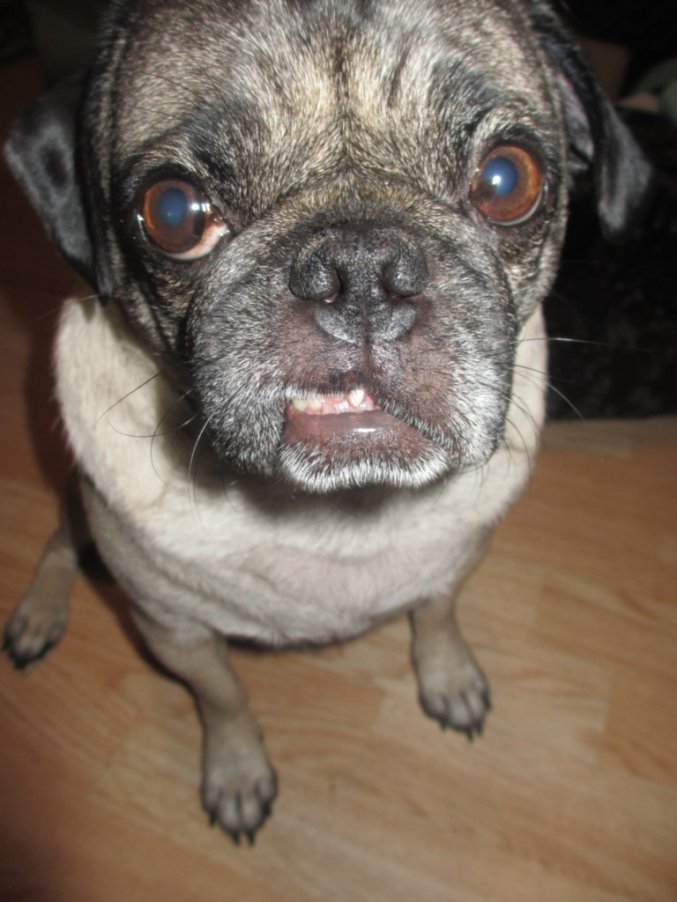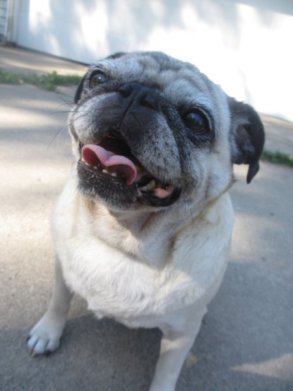
Pug Teeth Chattering – What Causes It
I used to occasionally see my pug Frank have teeth chattering. Basically, his jaw and teeth would shake against each other. It may be similar to what you envision when a cartoon person is extremely cold. I’ve recently learned that there are many reasons why pugs teeth chattering can occur. This post is going to cover the causes of pug teeth chattering.

He wasn’t chattering his teeth, here. I just thought it was a funny tooth-related photo. 🙂
Causes of pug teeth chattering
Cold or fever. If your dog is really cold (or feels cold due to a fever) this can cause teeth chattering. A pug’s normal body temperature is between 101F and 102F (or that’s 39C to 41C). If your pug has a fever, it’s time to head to the vet to see what is going on. If they’re just that cold due to their environment, you need to get them to a warmer area, ASAP! If it’s after they’ve had a bath, you may try to blow dry them or use towels to get them as dry as possible to help them warm up faster.
Anxiety. Sometimes teeth chattering is a symptom of anxiety, similar to shaky legs that humans experience. If your pug has teeth chattering when around other animals, when visiting the vet, getting their nails trimmed, etc then it’s probably a way that they show their anxiety.
Excitement – sometimes dogs get so excited that their jaw just kinda “dances” and causes teeth chattering.
Strong scents. This was the case with my pug, Frank. He’d chatter his teeth after smelling our female dog’s urine. Gross, right? It was true – though. He’d smell the part of the yard where she peed and then his teeth would chatter for a few seconds. He’d also do it if he just smelled between her legs when she had not urinated. I’ve read this is caused by their response to pheromones.
Dental problems. Pugs are prone to dental problems and decay. Sometimes if a dog is experiencing painful teeth or other pain in their mouths, they’ll chatter their teeth. This could be caused by a decaying tooth, an infection, and gum disease, among other oral health problems. A vet can help determine if your dog has dental issues that need treatment. If their breath has a strong odor, that’s one sign that it could be a dental issue. If you’ve seen any changes in their eating habits such as eating more slowly or eating less, this is another red flag for dental pain. Related post: Common pug health problems.
Seizures or neurologic causes. Sometimes chattering teeth is caused by a seizure or other neurological problems causing spasms in the jaw. If your dog chatters their teeth and also loses consciousness, seems confused or disoriented, drools, vocalizes or foams at the mouth, then it’s likely neurological in nature and you should visit the vet.
Bruxism. If your dog’s teeth chatter while they’re asleep it could be what is called bruxism, it’s similar to how some people grind their teeth in their sleep. It has a similar cause (stress or anxiety). Many vets are willing to treat dogs for anxiety issues if needed.

When to be concerned about pug teeth chattering
When it accompanies other behavioral changes. Most anytime that you see multiple changes in your dog suddenly, this should raise your concern. If your dog has started chattering their teeth and is lethargic, for example – that’s more concerning than teeth chattering alone.
If they show signs of a seizure. Any symptoms that suggest it could be seizure-related make it much more concerning.
If it’s persistent. The “normal” type of teeth chattering in response to excitement, anxiety or a strong smell or taste, should subside quite quickly. If your dog keeps chattering their teeth even when they aren’t experiencing a lot of sensory input or shouldn’t be experiencing strong emotions, this suggests it may have a physical or health related cause instead.
If you just can’t decide – If you just can’t determine the cause, it’s always safest to bring it up with your vet. If you can capture a video of your dog doing the teeth chattering to bring to the appointment, that may be helpful.

Leave a Comment